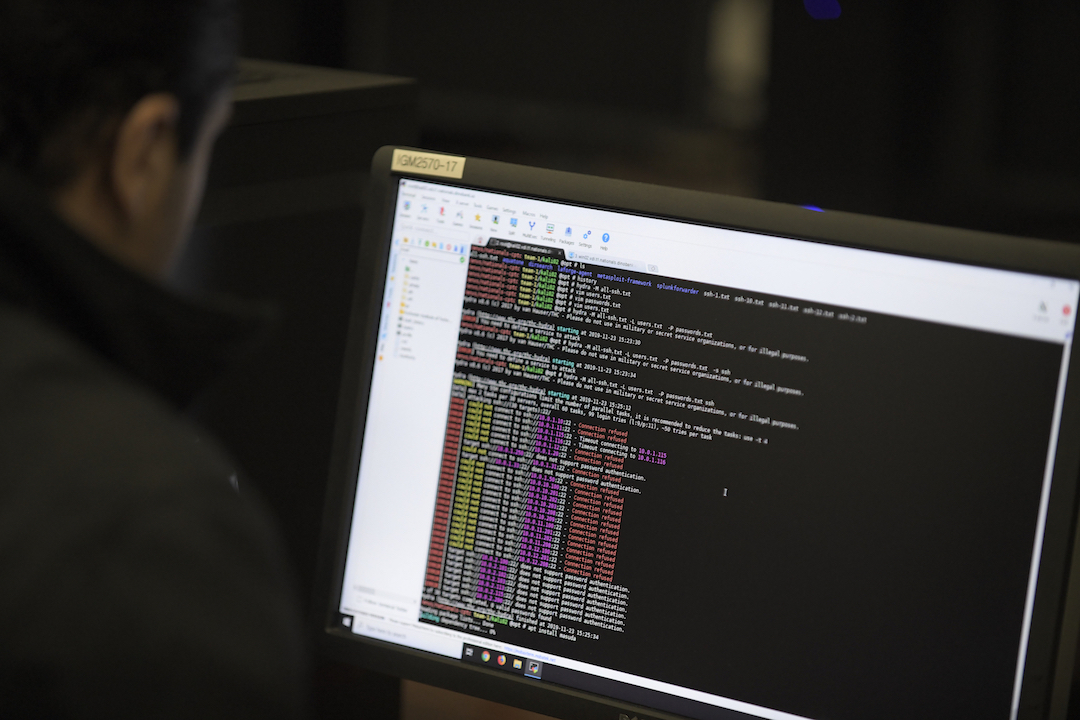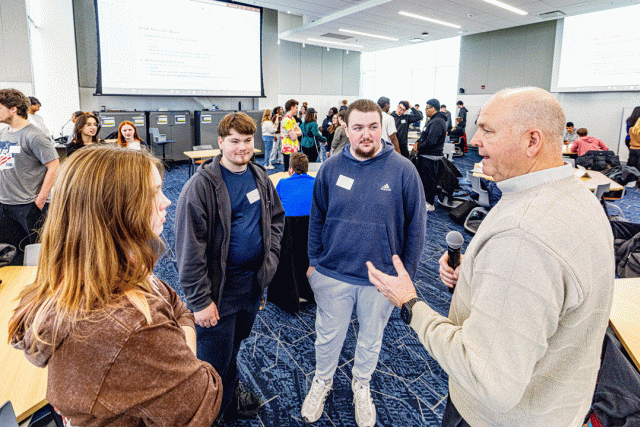RIT wins Northeast regional collegiate cyber defense competition
Student team moves on to compete for national cybersecurity championship in May
Mariah Rose Whitmoyer
RIT took first place in the 2020 Northeast Collegiate Cyber Defense Competition. The win gives RIT an automatic bid to the national tournament May 22–23.
A team of Rochester Institute of Technology cybersecurity students is moving on to the National Collegiate Cyber Defense Competition (NCCDC) after taking first place at the regional competition March 20–22.
The RIT students pulled together a win, despite having to compete from separate locations across the country, in response to the COVID-19 pandemic. The first-place finish means that RIT receives an automatic bid to the 2020 national competition, which is tentatively being held May 22–23 in a virtual format.
Ten college teams competed in the Northeast regional event, which was hosted remotely this year. University at Buffalo, SUNY placed second and University at Albany, SUNY placed third.
Jack McKenna, captain of the RIT team, said he was disappointed that they didn’t get to see their friends from other schools at the competition, which was supposed to be held in Orono, Maine this year. But, they were excited and grateful that NECCDC organizers were able to create an online option.
“We did our best to adapt to the new environment and make it work for us,” said McKenna, a fourth-year computing security student from Saint Paul, Minn. “I’m especially proud of the team this year.”
The cyber defense competition gives student teams the opportunity to assume responsibility for the information technology operations of a simulated organization, allowing them to apply cyber defense skills in a real-world scenario.
For the competition, a group of industry professionals from government and companies—called the red team—is assigned to break into computer networks to exploit information from a mock organization. Teams of students are “hired” by the organization to prevent that information theft from occurring.
Throughout the evolving COVID-19 situation, RIT’s team kept practicing using Discord and began working on ways to update their game plan for the new remote format of the competition.
“Despite the circumstances, everyone did a really good job maintaining clear and frequent communication with each other,” said Sean Newman, co-captain of the RIT team. “There is a lot going on all the time at the competition, and it takes the effort of the entire team working together to keep track of everything. We can always improve, but this year the communication was fantastic.”
The theme this year was “visibility.” Teams had to focus on getting insight into what was happening to their machines and services, through technologies that log information. The RIT team noted that their biggest challenge was the shift to a compressed time-format at this year’s event.
“Our team has an effective strategy — however, it often means we lose points early in the competition to ensure scoring in the late game,” McKenna said. “This year was no exception, but our strategy paid off and we were able to keep our services up at the end of the day.”
The RIT student team is made up of computing security majors McKenna; Newman, a fourth-year student from Fairfax, Va.; Simon Buchheit, a third-year student from Marysville, Ohio; Ali Alamri, a fourth-year student from Saudi Arabia; Adriano DeCastro, a fourth-year student from Stonington, Conn.; Robert Gray, a second-year student from Canandaigua, N.Y.; Connor Shade, a fourth-year student from Jersey Shore, Pa.; Mohammed Alshehri, a third-year student from Saudi Arabia; Daniel Szafran, a third-year student from Colrain, Mass.; and Phillip Babey, a second-year student from Newark Valley, N.Y. Alternate team members include Ella Daugherty, a first-year student from San Diego, and Craig Gebo, a second-year student from Rochester, N.Y.
The RIT team is coached by Bill Stackpole, professor in RIT’s Department of Computing Security, and assistant coach Justin Pelletier, director of the GCI Cyber Range and Training Center.
“These competitions are phenomenal learning opportunities for us students,” said Buchhet. “We get to put our skills to the test and see how we can perform against industry professionals who are simulating attacks that have been found out in the real world. For us as cybersecurity professionals, these competitions are laying the groundwork for great teamwork, communication skills and interacting with high-level executives.”
The annual event is the nation’s largest college-level cyber defense competition, an extracurricular activity that helps students build and hone the skills needed for a job in the cybersecurity industry — an industry that currently has a severe shortage of qualified professionals.
RIT’s cyber defense team is a perennial contender at the regional and national competitions. The Tigers placed third at nationals last year and won in 2013. RIT is also addressing the critical workforce needs in cybersecurity by creating the Global Cybersecurity Institute (GCI). The new three-story facility will allow RIT to address the global cybersecurity crisis by conducting groundbreaking research, education and professional training and development.
Other participants in the 2020 Northeast regional competition included Champlain College, Northeastern University, Pace University, United States Military Academy at West Point, University of Maine, University of Massachusetts Lowell and University of New Haven.
Nine more regional winners will be determined before the National Collegiate Cyber Defense Competition in May.



